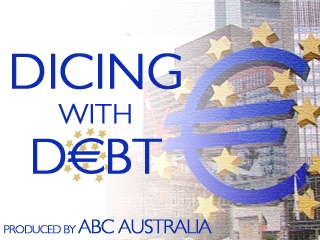We think of Greece as the most indebted Euro country. In fact Ireland is in as bad a financial situation and still at risk of going bankrupt - the only difference, the Irish didn't go straight out and burn the banks. And neither were they allowed to right off a significant chunk of their debt. This shocking investigation details the full story, from out of control criminal lending practises to brutal austerity measures. At it's core it asks why the ordinary Irish citizen is now responsible for it all?
Leading up to the global financial crisis, the entrepreneurs of Ireland were having a field day. Money was being borrowed, investment projects approved and the economy was booming. But as world financial markets reeled from the collapse of Lehman Brothers the Irish government made the cataclysmic decision to bailout the Irish banks.
It led to the country shouldering the banks' debt and in turn brought on the brutal austerity regime that's now taking the harshest toll on the Irish people.
"This was the Irish government putting all the debts of the banks, onto the quite frail shoulders of Irish citizens and taxpayers, and so far that's turned out to be in the region of 65 billion."
Now, with Europe heading towards recession, some in Ireland say it should demand a renegotiation of its bailout terms and 'burn' the bondholders, a move with the potential to create another financial panic.
"Basically this is extortion. It's the bullyboys of Europe, the European Central Bank, forcing us to pay a debt that was never ours..."
We hear from the failed entrepreneurs about the gambles they took and look at the vast investments that failed. They include
"ghost estates" where row upon row of 400,000 euro houses stand empty, awaiting their fate beneath the blade of a bulldozer. It's a sight for sore eyes, particularly if you're an ordinary Irish family looking at 17 years of harsh austerity to pay for them. The more so that there never were enough Irish families to fill the new houses, even if the economy had remained in high gear.
Was it fair that Ireland agreed to pay all failed bank bondholders, while holders of Greek Government debt are being asked to take losses? Many experts now agree Ireland will struggle to repay its debts, and the terms must be renegotiated. If that happens it's possible the reaction will set markets staggering again, in a new shock wave that will be felt beyond Europe.
WATCH MORE.
JOIN THE DISCUSSION.
 We think of Greece as the most indebted Euro country. In fact Ireland is in as bad a financial situation and still at risk of going bankrupt - the only difference, the Irish didn't go straight out and burn the banks. And neither were they allowed to right off a significant chunk of their debt. This shocking investigation details the full story, from out of control criminal lending practises to brutal austerity measures. At it's core it asks why the ordinary Irish citizen is now responsible for it all?
We think of Greece as the most indebted Euro country. In fact Ireland is in as bad a financial situation and still at risk of going bankrupt - the only difference, the Irish didn't go straight out and burn the banks. And neither were they allowed to right off a significant chunk of their debt. This shocking investigation details the full story, from out of control criminal lending practises to brutal austerity measures. At it's core it asks why the ordinary Irish citizen is now responsible for it all?

